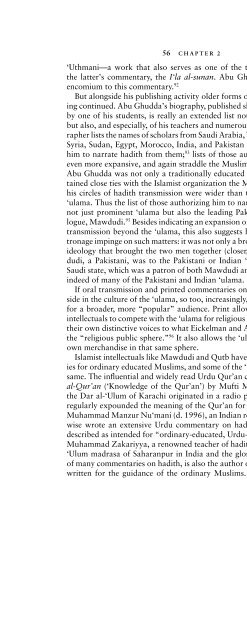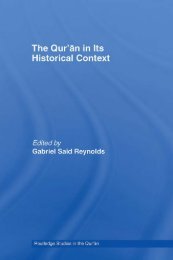Download (1 MB) - Islam and Christian-Muslim Relations: Articles ...
Download (1 MB) - Islam and Christian-Muslim Relations: Articles ...
Download (1 MB) - Islam and Christian-Muslim Relations: Articles ...
Create successful ePaper yourself
Turn your PDF publications into a flip-book with our unique Google optimized e-Paper software.
56 CHAPTER 2‘Uthmani—a work that also serves as one of the two prolegomena tothe latter’s commentary, the I‘la al-sunan. Abu Ghudda also wrote anencomium to this commentary. 92But alongside his publishing activityolder forms of transmitting learningcontinued. Abu Ghudda’s biography, published shortly after his deathbyone of his students, is reallyan extended list not just of his writingsbut also, <strong>and</strong> especially, of his teachers <strong>and</strong> numerous students. The biographerlists the names of scholars from Saudi Arabia, Turkey, Iraq, Yemen,Syria, Sudan, Egypt, Morocco, India, <strong>and</strong> Pakistan who had authorizedhim to narrate hadith from them; 93 lists of those authorized by him areeven more expansive, <strong>and</strong> again straddle the <strong>Muslim</strong> world. 94 Given thatAbu Ghudda was not onlya traditionallyeducated ‘alim but also maintainedclose ties with the <strong>Islam</strong>ist organization the <strong>Muslim</strong> Brotherhood,his circles of hadith transmission were wider than those of manyother‘ulama. Thus the list of those authorizing him to narrate hadith includesnot just prominent ‘ulama but also the leading Pakistani <strong>Islam</strong>ist ideologue,Mawdudi. 95 Besides indicating an expansion of the circles of hadithtransmission beyond the ‘ulama, this also suggests how politics <strong>and</strong> patronageimpinge on such matters: it was not onlya broadlyshared <strong>Islam</strong>istideologythat brought the two men together (closer, in fact, than Mawdudi,a Pakistani, was to the Pakistani or Indian ‘ulama) but also theSaudi state, which was a patron of both Mawdudi <strong>and</strong> Abu Ghudda, <strong>and</strong>indeed of manyof the Pakistani <strong>and</strong> Indian ‘ulama.If oral transmission <strong>and</strong> printed commentaries on hadith exist side byside in the culture of the ‘ulama, so too, increasingly, do works producedfor a broader, more “popular” audience. Print allows the new religiousintellectuals to compete with the ‘ulama for religious authority<strong>and</strong> to addtheir own distinctive voices to what Eickelman <strong>and</strong> Anderson have calledthe “religious public sphere.” 96 It also allows the ‘ulama to present theirown merch<strong>and</strong>ise in that same sphere.<strong>Islam</strong>ist intellectuals like Mawdudi <strong>and</strong> Qutb have written commentariesfor ordinaryeducated <strong>Muslim</strong>s, <strong>and</strong> some of the ‘ulama have done thesame. The influential <strong>and</strong> widelyread Urdu Qur’an commentary, Ma‘arifal-Qur’an (‘Knowledge of the Qur’an’) byMufti Muhammad Shafi‘ ofthe Dar al-‘Ulum of Karachi originated in a radio program in which heregularlyexpounded the meaning of the Qur’an for ordinarybelievers. 97Muhammad Manzur Nu‘mani (d. 1996), an Indian religious scholar, likewisewrote an extensive Urdu commentaryon hadith that is explicitlydescribed as intended for “ordinary-educated, Urdu-reading <strong>Muslim</strong>s.” 98Muhammad Zakariyya, a renowned teacher of hadith at the Mazahir al-‘Ulum madrasa of Saharanpur in India <strong>and</strong> the glossator <strong>and</strong> publisherof manycommentaries on hadith, is also the author of a number of tractswritten for the guidance of the ordinary<strong>Muslim</strong>s. Collected <strong>and</strong> pub-



